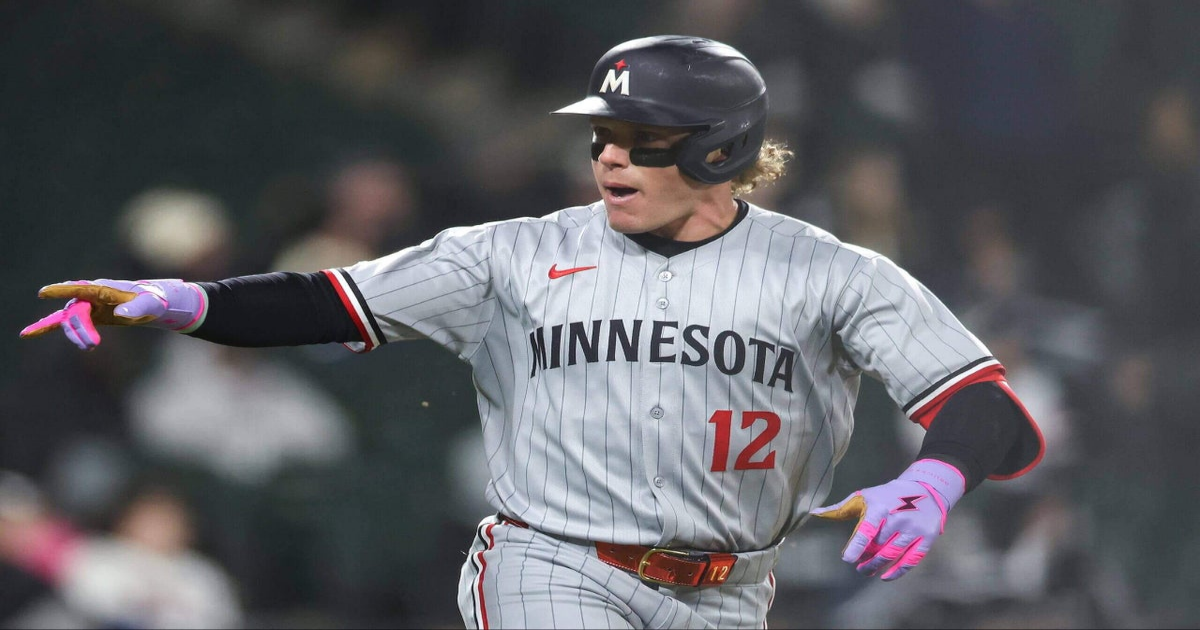CHICAGO — His outing finished, Simeon Woods Richardson retreated to the visiting clubhouse for postgame arm care ahead of the sixth inning Tuesday night.
Up until that point, the Minnesota Twins offense had endured another game of hard-hit madness where a handful of scorched baseballs found opposing gloves. But on the way to losing their fifth straight game to start the season, the Twins dugout encountered something it rarely had experienced early in the season: the euphoria of seeing batted balls fall in for hits.
Trailing by three runs, the Twins produced four two-out, run-scoring hits and their first crooked number of the season. The five-run inning and a late three-run home run by Harrison Bader, as well as a good night from the pitching staff, led the Twins to an 8-3 victory over the Chicago White Sox, their first win of the season.
That ball was CRUSHED pic.twitter.com/laTgXolVGd
— Minnesota Twins (@Twins) April 2, 2025
“We needed that bad,” said first baseman Ty France, who went 2-for-4 with a walk. “It was refreshing and comforting. It just felt like nothing was going our way. To finally put together a good rally, put together a bunch of good at-bats, a handful of singles, just a good inning overall. It was nice that it finally went our way.”
No amount of bad luck can be viewed as the culprit for the team’s 0-4 start, not when the Twins were outscored 28-6 in those contests. The starting rotation’s inability to keep three of the first four games close is why the Twins found themselves feeling as if they needed a victory in game No. 5.
But it’s hard to say Minnesota’s offense didn’t endure some bad luck. Of the first 92 balls the Twins put in play, only 16 went for hits, the team’s .174 average on balls in play accounting for the lowest such average in the majors.
Their difficulties continued in the early going against Chicago’s Rule 5 starter Shane Smith. Through four innings, the Twins offense produced the four hardest-hit balls of the game, each exiting the bat at 109.5 mph or better. Each also carried an expected batting average of .310 or better.
All four found gloves, including all three outs in the fourth inning.
“That was the point where, like, ‘Golly, you can’t make this up,’” catcher Ryan Jeffers said. “I think (Andrew) Benintendi led off the next inning with, like, a super dribbler, squibber. You can’t make this up.”
Leading 1-0 in the bottom of the fourth, Benintendi singled and advanced to third on a double by Lenyn Sosa, who finished 3-for-4. Brooks Baldwin, who singled in Chicago’s earlier run, followed with a sacrifice fly off Woods Richardson to make it a 2-0 lead.
An inning later, Nick Maton blasted a solo homer off Louis Varland to extend the lead to three runs and increase the chances that Twins fans en masse would decide to keep themselves warm by burning their jerseys and hats in barbecues and garbage cans across Twins Territory.
But the Twins adjusted against Smith, who limited them to four base runners through five innings and recorded the first two outs of the sixth.
“We kind of waited him out a little bit and got something going by letting him keep throwing and hopefully getting him out of the zone,” Twins manager Rocco Baldelli said.
Byron Buxton walked on four pitches to start the two-out rally in the sixth. Trevor Larnach followed with a free pass on five pitches.
Smith gave way to reliever Penn Murfee, and 10 pitches later, the Twins were in control. Jeffers started the hit parade with a bloop single to right to cut the lead to 3-1.
After France fell behind 0-2 on sweepers, he hit a third slider back up the middle for a run-scoring single. Murfee hit Willi Castro next to load the bases before Edouard Julien poked a liner to left for a tying single.
Jose Miranda followed by parachuting a 1-0 fastball for a two-run single to shallow right field to put the Twins in front 5-3.
None of the four exit velocities registered as a hard-hit ball (95 mph or above). In order, they were 84.8 mph, 92.9 mph, 94.3 mph and 65.1 mph.
“It’s not always who hits the ball hardest,” Baldelli said. “It’s fight and will sometimes. We had some really competitive at-bats where we found ways to put the ball in play. We used the whole field. We sprinkled in some hard-hit balls. It was nice to see us clump it together and compete well in that inning and pour it on a little and get momentum. The dugout really lit up.”
The clubhouse did, too.
Seeing what took place as he wound down after allowing two earned runs and five hits over four innings on a bitterly cold night, Woods Richardson wasn’t about to mess up his team’s newfound mojo.
Woods Richardson’s decision was justly rewarded, as the Twins extended their lead late on Bader’s three-run homer, his second of the season. The Twins bullpen did the rest, combining for a run allowed on four hits while striking out eight.
“I didn’t want to go out,” said Woods Richardson, who struck out five. “I didn’t want to jinx anything. I stayed inside the clubhouse until the inning was over, and then I came back out.”
(Photo of Harrison Bader: Geoff Stellfox / Getty Images)
